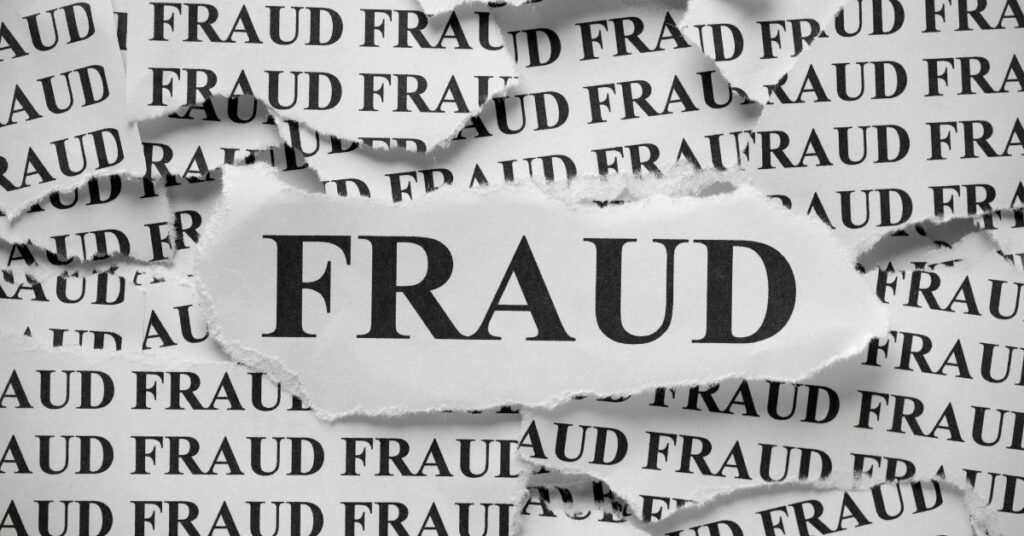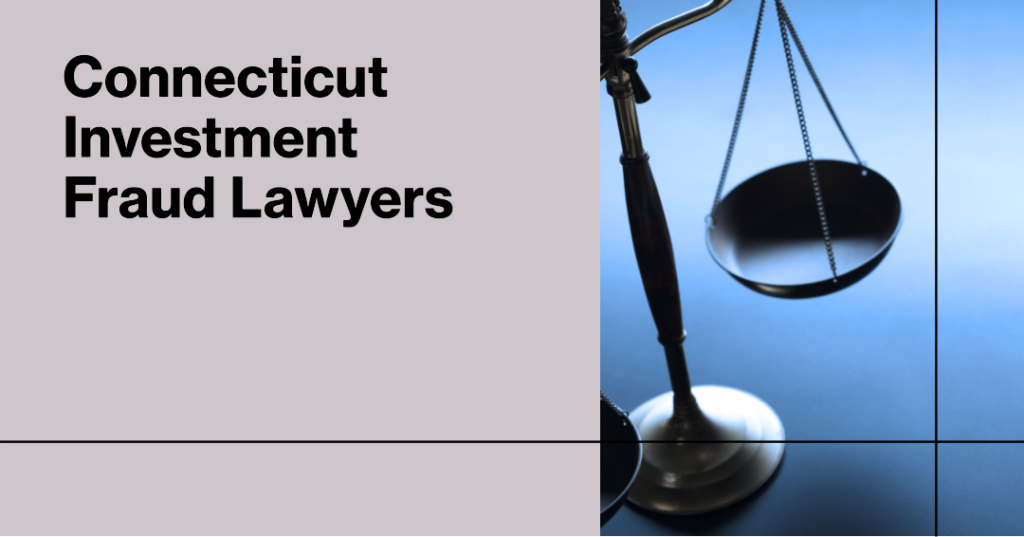Investment fraud is a growing concern affecting countless individuals yearly, causing significant financial losses and emotional distress. It’s crucial to understand how these scams work and the various ways you can protect yourself from falling victim to them.
Connecticut investment fraud lawyers play a vital role in preventing and resolving investment fraud-related issues by offering expert legal advice, support, and representation.
In this blog post, we will explore the concept of investment fraud, discuss the warning signs to watch out for, examine the role of Connecticut securities attorneys in fighting against it, and provide tips on safeguarding your hard-earned money from fraudulent schemes.
Key Takeaways
Table of Contents
- Investment fraud can take many forms, and investors must remain vigilant to protect themselves from potential scams.
- Connecticut securities attorneys play a vital role in preventing investment fraud by offering legal protections and remedies for victims of financial exploitation and fraudulent activities.
- To safeguard against investment fraud, investors should conduct thorough research on opportunities, ask questions before investing, read contracts carefully, seek professional advice from licensed advisers or brokers when necessary, and recognize warning signs such as guaranteed high returns with minimal risk or insisting on secrecy around an opportunity.
What Is Investment Fraud?
Investment fraud involves using deceitful practices to trick investors into making decisions that result in financial loss.
The Various Types Of Investment Fraud
Investment fraud can manifest in many forms, making it crucial for investors to remain vigilant and informed about potential risks. One common type is Ponzi schemes, in which new investor funds are used to pay returns to existing investors, creating the illusion of a profitable business when, in reality, there is no legitimate underlying investment.
Another prevalent type of fraud involves boiler room operations where high-pressure sales tactics are employed by individuals or entities that misrepresent their identity and offer non-existent investment opportunities.
Investors also need to be aware of stockbroker misconduct and investment advisor negligence. These professionals may engage in unauthorized trading or recommend unsuitable investments for personal gain while disregarding clients’ best interests.
Furthermore, insider trading poses significant risks as it involves the use of non-public information for personal profit or advantage at the expense of other market participants.
By understanding these various types of investment fraud scenarios and staying alert for possible warning signs, such as guaranteed high returns with minimal risk or an insistence on secrecy around an opportunity – investors can better protect themselves from falling prey to financial exploitation and related legal issues requiring assistance from skilled securities attorneys like those found throughout Connecticut.
Warning Signs To Look Out For
Investors should be wary of several warning signs that could indicate potential investment fraud. One common red flag is the promise of high returns with little or no risk.
Investment schemes that guarantee quick profits or pressure investors to act immediately also warrant suspicion.
Another warning sign to look out for is unsolicited investment offers from unregistered brokers or companies. Investors should exercise caution when approached by salespersons who provide limited information about themselves or their firms and seek large sums of money upfront before providing essential documentation.
Ultimately, investing always comes with a certain level of risk; however, by staying vigilant and seeking professional advice when necessary, prospective investors can protect themselves against falling prey to fraudulent schemes designed only to enrich scammers at their expense.
The Role Of Connecticut Securities Attorneys
Connecticut Securities Attorneys play a crucial role in protecting investors from financial loss by offering legal protections and remedies for victims of investment fraud.
Legal Protections And Remedies For Victims Of Investment Fraud
Connecticut securities attorneys offer legal protections and remedies for victims of investment fraud. Securities laws provide safeguards for investors, including registering and regulating brokerage firms, investment advisers, and other securities professionals.
The Connecticut Uniform Securities Act prohibits fraudulent practices such as insider trading, Ponzi schemes, and market manipulation.
Securities attorneys in Connecticut can help investors navigate the complex legal system by providing guidance on how to pursue claims against brokers or dealers who violate securities laws.
They can also represent clients during hearings before state regulatory bodies or in court proceedings to seek compensation for financial losses resulting from fraudulent activities.
For example, a Connecticut investor could work with a securities attorney to file a lawsuit against a broker-dealer who provided false information about an investment product that resulted in significant financial losses.
Overall, Connecticut securities attorneys play an essential role in protecting investor rights by helping them understand their legal options after falling victim to investment fraud.
Recovering Losses Through Lawsuits, Arbitration, And Mediation
If you have been a victim of investment fraud, seeking legal action and recovering your losses through lawsuits, arbitration, or mediation is possible.
A Connecticut securities attorney can help you navigate the complex legal process and determine the best course of action for your specific situation. Lawsuits can be filed against the individuals or entities responsible for perpetrating the fraud. At the same time, arbitration and mediation offer alternative dispute resolution methods that are often faster and more cost-effective than going to court.
For instance, in 2020, an investor recovered $1 million from UBS Financial Services Inc through FINRA arbitration after alleging that her financial adviser misled her regarding investment opportunities.
Protecting Yourself From Investment Fraud
Conduct thorough research on investment opportunities before making any decisions.
Conducting Thorough Research
Before investing your hard-earned money in any investment opportunity, it is important to conduct thorough research. This means going beyond the glossy prospectus and conducting due diligence on the investment issuer, brokerage firm, and investment advisor.
One way to conduct this research is by using FINRA’s BrokerCheck database to check out an advisor or broker’s background and track record. Investors can also visit the Securities and Exchange Commission (SEC) website to obtain copies of corporate reports filed with the SEC, such as 10-Ks, 10-Qs, or other relevant filings that provide essential information about an issuing company’s finances.
By conducting thorough research beforehand, investors are less likely to fall prey to fraudulent schemes masquerading as legitimate opportunities – saving themselves from significant financial losses in the process.
Asking Questions And Reading Contracts Carefully
Before investing in any opportunity, asking questions and reading contracts carefully is important. Investors should not shy away from asking tough questions about the investment opportunity they are considering.
They need to understand the risks involved, including the potential for loss, as well as how their money will be invested and when they can expect a return on their investment.
It is also essential to thoroughly review all documents related to an investment opportunity before signing them.
For example, suppose an individual receives a phone call offering an investment opportunity that sounds too good to be true. In that case, they must ask for detailed information about the company offering the deal and its management team.
They should be wary of high-pressure sales tactics and requests for immediate decision-making without proper time for due diligence.
Seeking Professional Advice
It is crucial for investors to seek professional advice when dealing with investment opportunities. Seeking advice from a registered investment adviser or broker can be immensely beneficial as they have the expertise and knowledge necessary to help you make informed and sound decisions.
Additionally, they can provide guidance on developing a diversified investment portfolio that aligns with your financial goals and risk tolerance level.
If you suspect an investment opportunity may be fraudulent despite seeking professional advice, seek assistance from securities attorneys in Connecticut who specialize in handling cases of investment fraud.
These attorneys can offer legal representation in negotiating a settlement or filing lawsuits on behalf of individuals who have suffered financial loss due to fraudulent activities such as insider trading or Ponzi schemes.
Recognizing The Signs Of Investment Fraud
It’s important to be aware of the warning signs of investment fraud in order to avoid falling victim to deceitful schemes. One common tactic used by scammers is promising excessively high rates of return on investments, which are unachievable or unsustainable in reality.
Another red flag is unsolicited offers from individuals who claim to have insider information about a particular stock or company. Additionally, be wary of pressure tactics and promises of guaranteed returns that seem too good to be true.

Choosing The Right Securities Attorney In Connecticut
When choosing a securities attorney in Connecticut, evaluating their experience, track record, communication skills, and fee structure is crucial to ensure you make the right choice for your investment fraud case.
Evaluating Experience And Expertise
When choosing a securities attorney in Connecticut, assessing their experience and expertise is crucial. Look for attorneys who have worked on cases similar to yours and possess knowledge of investment fraud laws and regulations.
For example, Merrill Lynch employee John Campeau was recently fined for violating securities laws by making unsuitable recommendations to clients over several years.
Additionally, consider evaluating the attorney’s success rate and track record when working on cases related to investment fraud. Researching reviews or asking for references from former clients can give you a good idea of how successful an attorney has been in securing favorable outcomes for their clients.
Assessing Track Record And Success Rate
When choosing a securities attorney in Connecticut, assessing their track record and success rate is crucial. A reliable attorney should be able to provide evidence of past cases they have handled and won.
In addition, consider the types of investment fraud cases the attorney has experience handling. For example, if you are a victim of Ponzi schemes or boiler room operations, look for an attorney who specializes in those areas.
Furthermore, take note of any accolades or recognition that the lawyer has received from their peers or reputable organizations such as Super Lawyers or Best Lawyers in America.
Remember that assessing track record and success rate is just one factor to consider when selecting a securities attorney in Connecticut.
Considering Communication And Availability
It’s important to choose a securities attorney who communicates clearly and is easily accessible. You want someone who will respond quickly to your needs and update you on the progress of your case.
An attorney should also be able to explain complex legal concepts in simple terms that you can understand. Look for an attorney who values timely communication and makes it easy for you to stay in touch.
One valuable resource when evaluating an attorney’s communication skills is online reviews from past clients. Pay attention to reviews that mention an attorney’s responsiveness, clarity of communication, and availability during critical stages of their cases.
Evaluating Fee Structure
It’s important to consider the fee structure of securities attorneys in Connecticut when selecting one to represent you in a case related to investment fraud.
Some attorneys may charge a flat rate, while others work on an hourly basis. It is crucial to understand their billing process and ensure that it aligns with your budget and expectations.
When evaluating fee structures, it’s also essential to consider any additional costs that may arise during the legal process, such as court fees or expert witness expenses.
A reputable attorney will be transparent about all potential costs and help you understand what you can expect throughout the legal proceedings.
Conclusion
In conclusion, investment fraud is a serious issue that can have devastating financial consequences for victims. Fortunately, Connecticut Securities Attorneys are well-equipped to help individuals navigate the complex legal landscape of securities laws and regulations.
Understanding the various types of investment fraud and taking proactive steps to protect yourself can minimize your risk of being scammed. Should you fall victim to fraudulent schemes, a seasoned securities attorney can provide invaluable guidance and representation in pursuing legal remedies and recovering losses.
FAQs:
1. What is investment fraud, and how can it affect me?
Investment fraud involves deceptive practices by individuals or companies seeking to gain money from investors through false promises, misrepresentations, or omissions of key information. If you have been a victim of investment fraud, you could lose significant amounts of money. You may need the services of a Connecticut securities attorney to help recover some or all of your losses.
2. How can a securities attorney in Connecticut help with my investment fraud case?
A knowledgeable Connecticut securities attorney can provide valuable assistance with all aspects of an investment fraud case, including conducting investigations, gathering evidence, negotiating with opposing counsel or regulators, and filing legal actions on behalf of clients who have lost money due to fraudulent activity related to investments they made in the past.
3. What are some common types of investment scams?
There are many types of investment scams that exist today including Ponzi schemes which involve paying earlier investors returns from new investor’s funds; boiler room scams, where high-pressure salespeople use hard-sell tactics to convince unsuspecting potential investors into making bad choices; and insider trading, where people trade based on non-public information that others don’t know about yet.
4. What should I do if I suspect I’ve been involved in an investment scam?
The first thing that anyone should do if they think they’ve fallen victim to an investment scam is immediately stopped investing any more funds into what might be considered “questionable” investments & then contact a professional such as a Connecticut securities lawyer for guidance handling potential subpoenas (or other associated legal action) needed during recovery efforts later down the line while ensuring not reveal any additional information required by regulatory authorities ahead-of-time without proper representation being present beforehand – as this could lead towards further complications throughout litigation process spanning years after the initial incident took place.


